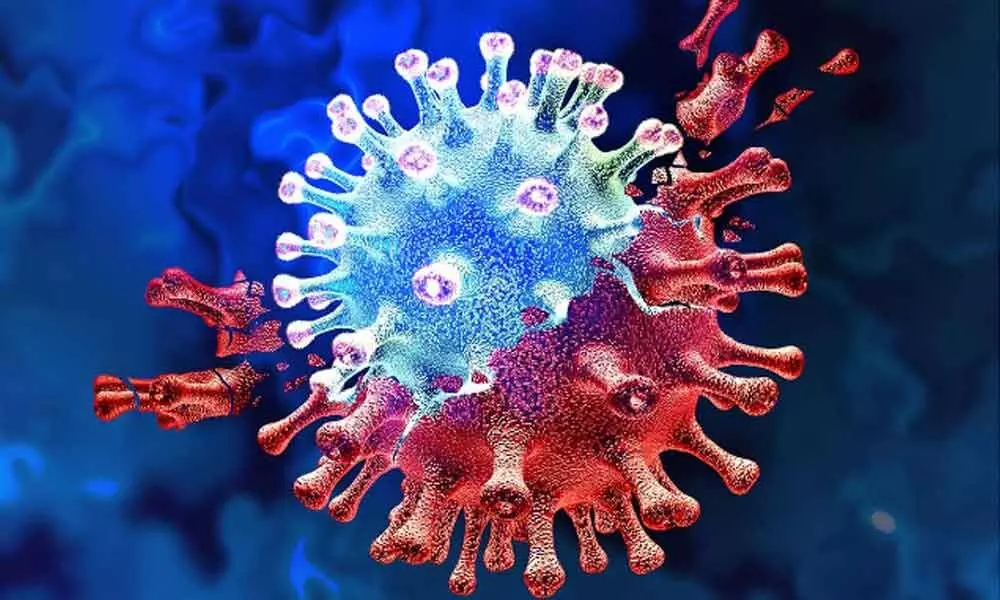Live
- Mikheil Kavelashvili is new Georgian President
- He makes things look easy: Smith on 241-run partnership with Head
- Decline in TB cases & deaths in India ‘remarkable’, shows ‘political commitment’, says former WHO Director
- PKL 11: Delhi dedicates win over Haryana to ‘junior express’
- Cyclone kills 14 in French territory Mayotte
- 3rd Test: Head, Smith centuries flatten India on Day 2
- AAP Announces Final Candidate List For 2025 Delhi Assembly Elections, Kejriwal To Contest From New Delhi
- Bangladesh unrest has delayed execution of some vital projects: Tripura CM
- PIL in SC seeks direction to designate BMC as sole planning, sanctioning authority for Mumbai
- 3rd Test: Centuries from Head, Smith help dominant Australia feast on listless India
Just In
WHO warns new Mu variant of COVID-19 could be more vaccine-resistant


Representational Image
The World Health Organisation has said that it is closely monitoring a new coronavirus ''variant of interest'' named Mu, warning that the new variant shows signs of possible resistance to vaccines.
The World Health Organisation has said that it is closely monitoring a new coronavirus ''variant of interest'' named Mu, warning that the new variant shows signs of possible resistance to vaccines.
Mu - also known by its scientific name as B.1.621 - was first identified in Colombia in January 2021, and since then, there have been ''sporadic reports'' of cases and some larger outbreaks in South America and Europe, the UN health agency said in its weekly bulletin on the pandemic on Tuesday.
The cases of the Mu variant have also been reported in the UK, Europe, the US and Hong Kong.
The new 'variant of interest' is being closely monitored, the UN health agency said.
Although the global prevalence of the Mu variant among sequenced COVID-19 cases is currently below 0.1%, its prevalence in Colombia (39%) and Ecuador (13%) has consistently increased, it said.
The new variant was added to the WHO's watchlist on August 30 after it was detected in 39 countries and found to possess a ''constellation of mutations that indicate potential properties of immune escape,'' it said.
Reports on the variant's prevalence should be ''interpreted with due consideration" given the low sequencing capacity of most countries, the UN agency said.
Mu is the fifth variant of interest to be monitored by the WHO since March. It has a number of mutations that suggest it could be more resistant to vaccines, the WHO warned, but said that further research would be needed to confirm this.
The preliminary data shows it may evade immune defences in a similar way to the Beta variant first discovered in South Africa, the UN agency said, adding that this needs to be confirmed by further work.
''More studies are required to understand the phenotypic and clinical characteristics of this variant," it said, adding that the epidemiology of the Mu variant in South America, particularly with the co-circulation of the Delta variant, will be monitored for changes.
As of August 29, over 4,500 sequences (3,794 B.1.621 sequences and 856 B.1.621.1 sequences), genome sequences, analysed samples of the virus taken from patients, have been designated as Mu in the past four weeks. The sequences are used to track how it moves through the population, on an open-source genome repository, known as GISAID.
Most of these have been reported in the U.S (2,065) and Colombia (852), Mexico (357) and Spain (473).
Meanwhile, South African scientists are closely monitoring the development of another new variant there.
Scientists from National Institute for Communicable Diseases (NICD) and the KwaZulu-Natal Research Innovation and Sequencing Platform (KRISP) in South Africa said the potential variant of interest, C.1.2, was first detected in the country in May this year.
C.1.2 has since been found in China, the Democratic Republic of the Congo, Mauritius, England, New Zealand, Portugal and Switzerland as of August 13, they said.
However, C.1.2, is not yet a variant to follow, nor a variant of concern, according to the classification of the World Health Organization.
All viruses mutate over time and most mutations have little to no impact on the virus' behaviour.
The novel coronavirus pandemic has killed more than 45 lakh people globally, according to tracking data from Johns Hopkins University.

© 2024 Hyderabad Media House Limited/The Hans India. All rights reserved. Powered by hocalwire.com






